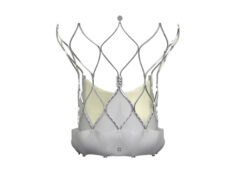 The US Food and Drug Administration (FDA) has approved the Navitor (Abbott) transcatheter aortic valve implantation (TAVI) system for the treatment of severe aortic stenosis among patients who are at high or extreme risk for open-heart surgery.
The US Food and Drug Administration (FDA) has approved the Navitor (Abbott) transcatheter aortic valve implantation (TAVI) system for the treatment of severe aortic stenosis among patients who are at high or extreme risk for open-heart surgery.
“Abbott’s Navitor device features advancements to help doctors safely and effectively treat patients with aortic stenosis, including a design that reduces the backflow of blood around the valve that is often a complication following TAVI procedures,” said Michael Reardon (Houston Methodist Hospital, Houston, USA) who served as principal investigator for the study that led to FDA approval. “The innovative Navitor system also offers physicians stable and accurate device placement, even in challenging patient anatomies.”
Navitor features a fabric cuff—NaviSeal—to reduce or eliminate paravalvular leak (PVL), and Abbott describes the device as the only self-expanding TAVI system with leaflets within the native valve; a feature intended to improve access to coronary arteries to facilitate future procedures for treating coronary artery disease.
The Navitor device is implanted using Abbott’s FlexNav delivery system, which features a slim design to accommodate different patient anatomies and small vessels for stable, predictable and accurate valve delivery and placement.
“Our Navitor valve builds upon our industry-leading portfolio of minimally invasive devices that surpass existing standards of care to address a range of heart diseases,” said Michael Dale, senior vice president of Abbott’s structural heart business. “Navitor is the first TAVI system to offer optimal haemodynamics in all valve sizes while also preserving options for lifetime disease management, an important consideration for physicians and patients when selecting a TAVI solution. Receiving this approval is a major next step in our mission to help people live better lives through better health.”










